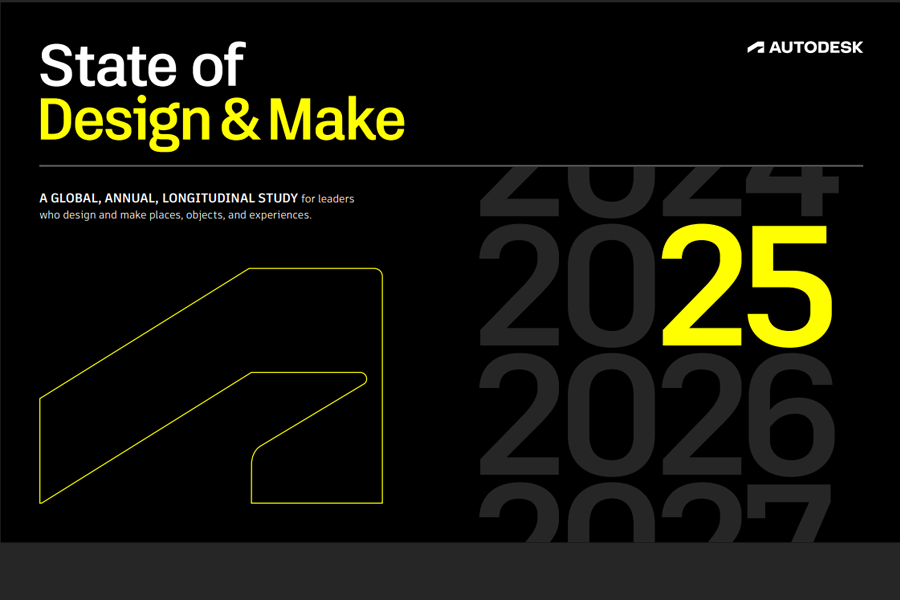Autodesk’s 2025 State of Design & Make Report
 Other News
Other News Subscribe to newsletter
Subscribe to newsletter
| 5 May 2025 |
Autodesk has released its third annual State of Design & Make Report, offering global and regional insights into how industries are navigating the intersection of digital transformation, talent shortages, AI adoption, and sustainability. In the Middle East, findings from 260 industry leaders reveal cautious optimism in the face of global uncertainty, with local businesses increasing investments in technology, talent, and sustainable practices.
Despite macroeconomic pressures and a rapidly shifting geopolitical environment, 65% of leaders in the region say they will increase their investments over the next three years, aligning with ongoing national efforts such as Saudi Arabia’s Vision 2030 and the UAE’s Net Zero by 2050 Strategy.
Middle East Leaders More Invested in AI’s Potential — Despite Global Caution
Global sentiment around AI cooled slightly in 2025, with Middle East leaders matching this trend while remaining comparatively optimistic with continuing investments.- 67% of respondents in the region say AI will enhance their industry (on par with global average but down from 84% in 2024)
- 58% acknowledge AI could be disruptive, reflecting a balanced and realistic outlook
This is reflected in regional mega-developments like NEOM, Expo City Dubai, and the Red Sea Project, where AI and generative design tools are already being used to model sustainable cities and optimize infrastructure before ground is even broken.
Talent Challenges Persist, But the Middle East is Gaining Ground
As in many parts of the world, technical talent shortages remain a significant obstacle.- 54% of leaders in the Middle East say lack of skilled talent is hindering growth
- 57% struggle to find employees with the right technical skills
- 37% list AI capabilities as a top hiring priority in the next three years
The next generation must master AI skills to thrive, working alongside technology rather than against it. Industry leaders must bridge the gap between education and the demands of an AI-driven workforce by democratizing access to technology, creating effective curriculums, and increasing job awareness. These efforts – also encouraged through the Autodesk Education Platform – will build a diverse talent pipeline and drive growth, equipping the future workforce.
Sustainability Goes Mainstream in the Middle East
The Middle East stands out globally for its proactive embrace of sustainability as both an economic and environmental imperative.- A remarkable 98% of ME leaders say their organizations are actively becoming more sustainable — higher than 95% globally
- 84% believe sustainability can generate more than 5% of their annual revenue, vs. 79% globally
- 40% are using AI to drive sustainability goals, matching and surpassing certain EMEA benchmarks
Digital Transformation Is Paying Off
Middle East companies are seeing clear ROI from digital investments:- 45% cite productivity gains
- 34% report improved customer satisfaction, matching global sentiment
- 29% report cost reductions, even as broader economic conditions remain volatile
“The Middle East’s industries are in a pivotal moment of transformation,” said Naji Atallah, Head of Construction and Manufacturing for EMEA Emerging at Autodesk. “We’re seeing a region that is ambitious, forward-looking, and actively aligning its economic diversification goals with digital innovation and sustainability. While the global narrative is one of caution, the Middle East is leaning into opportunity—focusing on talent development, AI integration, and smart design as levers for long-term growth.”
As the race to 2030 accelerates, companies are aligning their technology investments with sustainability goals, turning their environmental commitments into competitive advantages.
Website:
https://damassets.autodesk.net/content/dam/autodesk/www/pdfs/2025-sdm-report-final.pdf





